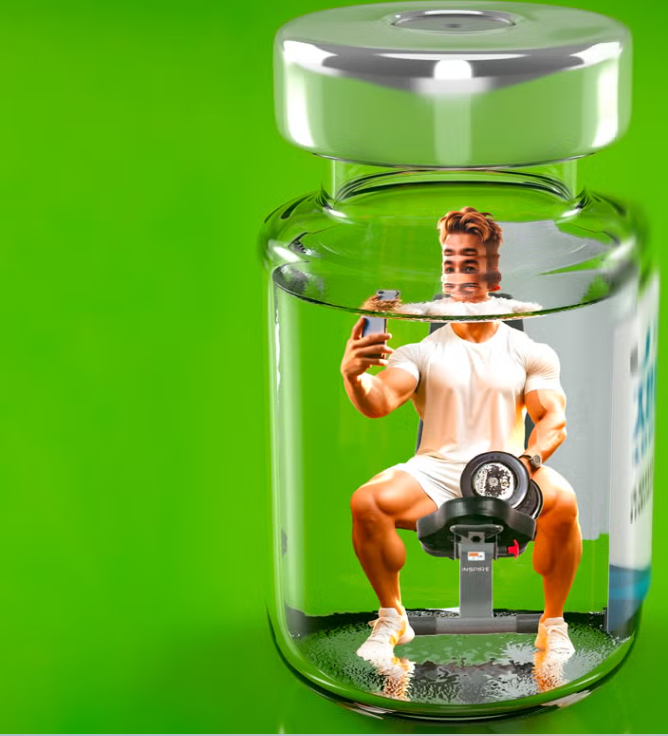This article is a follow-up to my earlier published work, which explored the history of the bodybuilding industry in Kenya — from a dungeon sport reserved for the poor and lower middle class to a thriving industry creating employment opportunities, particularly in middle- and upper-middle-class neighborhoods. It is on the strength of that work, and the encouragement of my friend, Livingstone Eshitika, the CEO of Wazito Fitness, that I decided to take a deeper dive into the supplement and nutrition industry, a sector that has grown in direct response to the expansion of the fitness scene, especially in Nairobi.
The aim of this article is not to promote or demonize the use of steroids or other performance-enhancing substances, but rather to document their origins and the fascination they have attracted across social media platforms.
A Historical Perspective
The idea of achieving an aesthetically pleasing physique dates back to ancient Rome. The gladiators, admired for their strength and physical appeal, were fed diets rich in carbohydrates, mainly barley and legumes, making them predominantly vegetarian.
Fast forward to World War II, when German scientists began experimenting with anabolic steroids, often on concentration camp prisoners, to study their effects on humans. These experiments, sanctioned by the Nazi high command, aimed to make soldiers more aggressive and to reinforce the notion of Aryan physical superiority.
During the Cold War, the Soviet Union institutionalized steroid programs to enhance its Olympic athletes’ performance, a practice that soon spread globally.
The Evolution of Kenya’s Fitness and Supplement Scene
In the 1990s and early 2000s, there was very little local knowledge about supplements and nutrition among Kenyan bodybuilders. Most information came from overpriced secondhand fitness magazines sold by hawkers on Nairobi streets. Those with relatives abroad could access magazines like Muscle & Fitness, which offered insights into training techniques and supplementation, though much of it was exaggerated or commercialized.
A turning point came in the late 2000s when USN Kenya (Ultimate Sports Nutrition) — a local branch of the South African company founded in 2000 — partnered with former multiple Mr. Kenya champion Lee Lihanda to open the first supplement and nutrition store on the ground floor of the Hilton Hotel along Moi Avenue.
By the late 2010s, international supplement brands such as Optimum Nutrition, MuscleTech, BSN (Bio-Engineered Supplements), and Cellucor had entered the Kenyan market through local distributors. Unlike USN, whose popularity spread mainly through word of mouth, these global brands leveraged social media marketing, especially via WhatsApp fitness groups. This digital exposure not only boosted supplement sales but also popularized fitness culture, evident in the rise of amateur bodybuilding competitions and local gym meet-ups.
The Rise of the Steroid Craze
Despite the wide availability of legitimate supplements and access to credible training information, there has been a growing fascination with anabolic steroids, especially among young fitness enthusiasts who desire rapid muscle growth.
Several factors contribute to this craze. The growing demand for physically imposing bouncers by event organizers, security firms, and recruitment agencies seeking workers for security-related jobs in the Gulf countries has created pressure for rapid muscle gain. At the same time, fitness brands increasingly prefer ambassadors who can maintain competition-ready physiques throughout the year, compelling many to rely on artificial enhancement to meet these expectations. Influencers and trainers also feel the need to use steroids to sustain their ideal body image and retain lucrative sponsorship deals. Additionally, the rise of online men’s forums such as the manosphere and red-pill movements—which advocate a return to hypermasculine ideals as a counter-response to the “metrosexual” image popularized in the 1990s—has further amplified the obsession with physical dominance and muscular perfection
Social media has further fueled this fascination. International influencers like Sam Sulek and Larry Wheels openly discuss their steroid use, while locally, personalities such as Gachau Njoroge share their steroid cycles and give advice on managing side effects through over-the-counter drugs and dietary supplements.
The Consequences and the Contradictions
While many in Kenya’s fitness community still rely on strict diets, supplements, and disciplined training, the increasing online advocacy for steroid use is subtly influencing even recreational gym-goers. Despite abundant research warning about the risks of prolonged steroid use, the desire for quick results often overrides caution.
Ironically, many fitness enthusiasts claim that the true value of training lies not just in physical transformation but in cultivating discipline, patience, consistency, perseverance, and self-esteem. In that light, steroid use can be seen as a shortcut, one that undermines the deeper personal growth that fitness was meant to nurture.
John Maina Githinji is a Socio-Economic and Political Analyst


